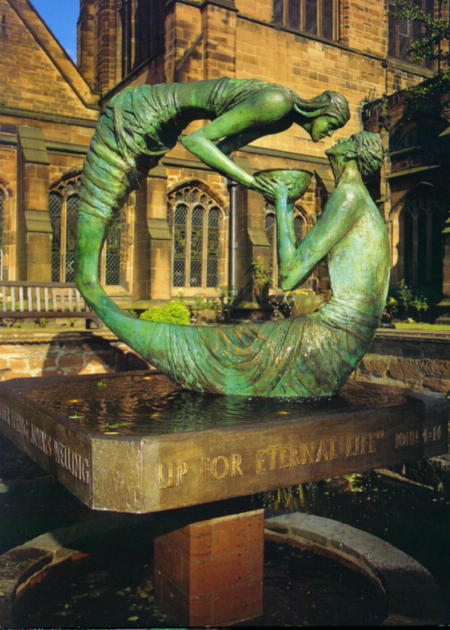
Stephen Broadbent's "Samaritan Woman at the Well," sculpture at Chester Cathedral, England. Sculpted in 1994.
How often have we looked at someone and in that one look, made a snap judgment, placing that person in her place because of the way she dresses, deciding that because he is so good-looking, he must be a good guy?
And how often have we had someone take one look at us and make a snap decision about who we are, because of how we look, where we are, how we act in that one second of our lives?
“You could just tell that she was …”
“I knew just looking at him …”
Snap judgments, we call them.
No matter how many times we discover — later on — that we were wrong, that the scruffy-looking one had a giant heart for helping others, that the good-looking one was really a cad, we still make snap judgments about people all the time.
The first day I dared to venture out on my own in Haiti – completely on my own, with only my newly learned Creole and my bravado to accompany me – I made it only one block before I was surrounded by Haitian men.
“Miss! Miss!” one very tall man yelled. “Buy my painting?”
Soon every single one of these men was saying the same thing: “Miss! Miss! Buy my painting? No, buy mine! I give you a very good price. American money, no problem!”
These men, who had never seen me before and who presumed that because I am white I was (a) American, (b) rich, (c) willing to part with my money, and (d) willing to part with way too much of my money because I was (a) American and (b) rich, made a snap judgment about me. They never asked my name. They never engaged me as a real person.
To them, I was merely a quick buck – a buck they desperately needed, to be sure, so that they could support themselves and their families – but a buck nonetheless.
When Jesus and the Samaritan woman met at Jacob’s well in Sychar, there was a whole lot of snap judging going on.
The woman made snap judgments about Jesus:
•Just another man used to ordering women around;
•An outsider (she didn’t know him, and trust me, in small villages, everyone knows everyone);
•A Jew (most likely because of his dress and perhaps his accent – otherwise, Samaritans and Jews pretty much looked and sounded alike);
•And therefore an enemy of sorts (Jews and Samaritans hadn’t gotten along for almost 600 years, ever since the Babylonian exile – it was an old theological argument about whose worship was better, purer, truer, more faithful …).
The disciples, who show up a tad later in the story, made their own snap judgments about the woman:
•A woman and therefore a lesser human being (sorry, ladies, that was a fact in the days when our Lord and Savior walked the earth);
•An enemy of sorts (remember what I said before about Samaritans and Jews – we’re talking about almost six hundred years of enmity here …);
•A brazen woman (men and women did not speak to each other in public if they didn’t know each other, and since Jesus was their Lord and Teacher, she obviously must have been the one to initiate the conversation, which only a brazen woman would have done);
•And an outsider in her own village (she was drawing water alone, something that women do in groups for all kinds of reasons, the first being the community that forms when people are doing arduous work together).
And Jesus? Well, he, too, made a snap judgment. But his was of a different sort, for he looked at this woman and instantly – instantly – saw who she was and what she was:
Jesus took one look and knew that she was a beloved child of God, in need of all the love and affirmation that only God could give her (because, obviously, her community wasn’t showering her with its love).
It was Jesus’ snap judgment that counted in the end … that overruled the snap judgments of both the woman and his disciples, that declared that despite what the woman thought of herself, despite what the disciples thought of her, despite what anyone thought of her, this woman was a beloved child of God.
So this woman, who came to the well to slake her physical thirst – to satisfy her need for actual water – ended up having her spiritual thirst, her need to be known and loved, satisfied instead.
She already was known – oh, my, was she known in Sychar. Everyone knew that she had had five husbands and was now living with another man – without benefit of marriage. Everyone knew that obviously, she had sinned in some way, for why else would she have been widowed so many times, or divorced so many times, or some combination thereof? And everyone knew that since she by living with a man without benefit of marriage, she obviously was a sinner!
But she didn’t want to be known that way. I mean, who would? Who wants to go through life having others look at you and find you wanting, in just a glance? Who wants to be thought of as a lesser human being, as a sinner, because of circumstances beyond your own control? Who wants to feel unloved in a world in which love is in such short supply as it is?
This Samaritan woman at the well? She was dying of thirst for a little bit of love. And here comes Jesus – an outsider himself, traveling through a foreign land – who looks at her and instead of finding her wanting, knows her to be a beloved child of God, loved from before time until the ages of ages.
He knows her story, he knows her life, so well … he knows that what she wants more than anything else is to know that she is loved, despite the circumstances of her life, despite any choices she has made, despite any sins she has committed. Jesus knows that God looks at her and makes God’s own snap judgment: I love you.
My friends, the bad news is: God knows you. God knows everything about you … everything.
The good news is: God knows you. God knows everything about you … everything.
And God still loves you.
Exactly as you are …
Even when you make mistakes …
Even when you sin …
Even when others do not appreciate you …
Even when others shun you …
God still loves you.
The only snap judgment that God makes about us – about each of us – is that we belong to God. And because we belong to God, we are known … and in that knowing, we are loved.
You want to slake the thirst you have, that we all have, to be known and loved?
Well, know this:
God knows you and God still loves you.
Now, I don’t want you leaving this place today and going home saying, “The Episcopal preacher at church said today that we can do whatever we want, because God loves us.” No! Don’t say that, because God does judge us! God has high standards for us. God’s desire, God’s dream for us, is that we become the people God has created us to be: People who love. People who love God, people who love each other, not just as ourselves (that’s hard enough to do on the days when we love ourselves, but on those days when we don’t love ourselves? Well, on those days, it’s really easy not to love our neighbors), but as Jesus loves us.
Which means that God wants us to live our lives as God’s beloved children in God’s community of beloved children.
Not by looking at each other and making snap judgments based on societal standards that could not care less about what God wants.
Not by shunning each other.
But by caring for each other.
By loving each other.
It’s a tall order, isn’t it? To love one another as Jesus loved us, as God loves us?
Living lives of love means that we have to stop making snap judgments and start living in community. We have to talk with each other. We have to listen to each other. We have to get to know each other, not on the surface, not by our looks or our dress or the color of our skin or our accents … but deep down, by our stories.
Because only then can we really know each other. Only then can we really love each other.
• • •
Those young men on the street in Haiti, the ones who surrounded me and tried to sell me their paintings, who viewed me as nothing more than a quick buck to be made?
Their names are Frantzy. And Tony. And Patrick. And Enil and Hercules. And Ernest and Salwa and the other Enil …
After I convinced them that I was not going to buy art from them, that I lived there now and was not a rich American tourist or aid worker but a missionary and priest, we started to get to know each other. We told each other our stories. We began to look out for each other. We began to take care of each other.
When we stop looking at each other as objects and start getting to know each other, start learning each other’s stories … well, that’s when we begin to live into the image in which God has created us, an image of love and community.
Trust me:
God knows our stories.
And God still loves us.
And if that knowledge doesn’t slake your thirst, doesn’t satisfy your deepest needs, I don’t know what will.
We are known.
And we are loved.
Amen.
A sermon preached on the Third Sunday of Lent, 27 March 2011, Year A, at Bensalem United Methodist Church, Bensalem, PA.





